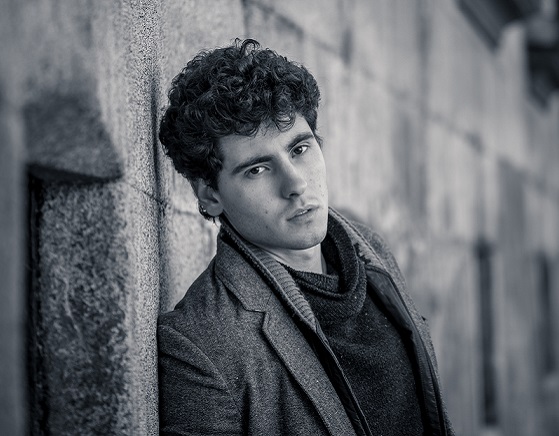The Death Maiden and the Youth in Spring.

{source}
If I hadn’t been so vain, The Death Maiden might have taken me.
That year the Second Intifada surged through the land, bringing death to those caught in its seething matrix of destruction. Both sides of the conflict lost their youth to the voracious rift opening from the past to swallow the future.
I could have been at The Shuk that day, as I planned to travel within Israel through spring. I might have lost myself in the fragrant spices mingling in potent pungency with the cries of vendors announcing their wares in the clamoring bustle of the marketplace.
Instead, I got a ticket to Italy, the timing influenced by a gimlet-eyed soldier on a Jerusalem-bound bus telling me that I should be a model, that I looked like a Caravaggio boy, that they’d love me in Italy. He studied architecture and had really strong-looking, tanned hands.
I had planned on traveling through Italy after Israel, but he added a feverish intensity to my plans.
I would have preferred to have been compared to a Botticelli figure, as much of my pilgrimage to Italy was to see The Birth Of Venus.
I wanted to be transfixed by it, as I’d always adored it and paused in rapt attention whenever my gaze found an image of it, moving around its every area lovingly. From the crisp, angular waves to Venus’s remote serenity. I found something familiar in that distantly dreamy countenance, that ovular face tilting away from knowability with an attention that seemed to be drawn within.
Caravaggio’s subjects often seemed ribald and almost vulgar to me, eyes brashly meeting the viewer with a solicitous directness.
Of course I was too full of tremulous, giddy embarrassment to say any of this, so I nodded ruddily as he talked about Italian art. My grandmother and I would take trips to art galleries when I was a kid, I had the coffee table art book collection of a worldly adult before I graduated high school.
I was a teenager who had felt odd growing up, my ethnically ambiguous features didn’t seem to garner praise until my latter teens. When I went abroad, people began to tell me I should model, torquing my very unsteady ego greatly in opposition to my late-childhood invisibility.
It lit up my mind like a drug, exhilarated and heated I’d feel a flush rise in my cheeks which seemed to make the observer smile more appreciatively. I always felt the desire to run away with the token of approval they’d imparted, in case it was bestowed mistakenly and belonged to someone else.
But I was on a bus, with a soldier on a break. He was clad in that distinctive green sweater, a deceptively drab garment that proclaimed to all who saw it the wearer’s militant might.
I knew very little about the world then, and I found it intensely alluring.
He was only going to Jerusalem for a couple hours, then headed to Tel Aviv to “just chill, man.” Israeli men often spoke like Californians in the 80’s, irony being a slow export. He had an Adam’s apple that bobbed with prickly earnestness beneath a sturdy, squarish face.
I wanted to go back in time with him, and to Tel Aviv.
He had light blue eyes circled in a dark indigo rind, olive skin and a girlfriend who was at the time “having moods like a bitch.” To this day, if I’ve been exceptionally moody, I’ll tell myself sternly that I’m “having moods like a bitch” and I’ll find it reliably funny.
This was before I knew anything about the kind of attraction I’d possess, I didn’t realize this would be a pattern. Not soldiers, really, but men on a break, a reprieve from their usual interest in women. Some combination of mixed-ethnicity, youthful androgyny and boyish approachability marked me for the eyes of men that didn’t usually find other men desirable.
Something archetypally Mediterranean awoke in me, a youth that was both innocent and paradoxically aware of his innocence, leveraging it with blushing, half-conscious charm.
The children of The Levant are pressed upon by myths, archetypes and history.
The Death Maiden too had been imposed upon by overarching themes of the land, though in far less pleasing ways. The cell given life in her by the attention of the Israeli military was a rage born of domination and oppression, and the seed said to have been planted in her unwed body by a Fatah operative would have been an unlivable shame.
I think of her now, she was just a couple years older than me at the time, in the same land, in the same chapter of history. I think of how differently fate would weave our threads in the tapestry of the Mediterranean that Spring.
I would pack treasures found on various adventures into a bright green backpack, as she would conceal a bomb packed with nails into a black purse to rend the flesh of the people who subordinated her clan and demolished her family home. It was destroyed in retaliation for the failed attacks her family had planned. She took up their mission, inspired by women she saw as warriors for her people.
Thinking of that year, I’m struck by the ephemerality of the experience for me, as if I washed myself clean of its hold in the Mediterranean Sea before turning West on my vernal adventure.
That year was full of attacks from both sides, the land streaked with the blood of vengeance drained from the bodies of the young. Somehow, I existed in an uncanny daze, struck by my own vitality and promise, startled into wonderment by my own blossoming. My eyes were fixed on the reflection of myself in the mirror or in the eyes of others, I didn’t feel the garden around me being ravaged.
My world existed in moments that I’d save in my mind, telling no one, pressed like petals in a book only I could read. Moments like the night in Tel Aviv with the blue-eyed soldier, swimming nude in the sea with him, accepting a back rub from his tawny hands that had never touched a male body with tenderness or desire before.
The quickening I felt and ultimate exuberance as I left him on the beach, allowing only a lingering kiss on the cheek and a scrawled email on the fleshy curve of my palm that I washed off with pristine hotel soap within the hour. Soap that was pure and untouched and implacably but pleasantly floral, like me that year.
I went to Italy, I was undressed and photographed in agencies and told that I had potential, which was all I really needed then.
I was given cards and the contacts of photographers to do “test shoots,” but they became tattered in my roiling emerald bag and had the same impermanence then as the soldier’s black ink etchings that faded into latticed tracings, washed clean from my hand’s Mount Of Venus.
Once I knew I could have something, I always ran from it.
My body could serve a purpose, it was valuable. It was the new incarnation of my tribe, and it could be useful.
The Maiden and I had that in common. We had more than that in common, as our people were not as divided as modern geopolitical lines would have one believe. Before Abrahamic fracturing, the people of The Levant were less distinct, as genetics and archeology reveals to those who wish to see the roots to understand the flower.
Our ancestors once prayed to Astarte, warrior and sex goddess, to protect them. Little did they know the goddess would be abandoned and claw her people apart.
Astarte is the goddess of the morning star: Venus.
Traveling West, she became Aphrodite, diminished and bathed clean of her warrior strength, sanctified in Western ideals of sexuality and feminine beauty.
Her ferocity was divided among other figures in the patriarchal Greek pantheon, Artemis inherited some in syncretism, taking the mantle of Mistress Of The Beasts.
The Goddess was known by different names before her journey West: Ishtar, Cybele, Ashtoreth, and the Sumerian Inanna.
She is an archetype of the Mediterranean, as is her eternally puerile consort, a youth of cyclic, seasonal rebirth.
I see now that both The Maiden and I were possessed by archetypes in our ancestral land. She was a ferocious woman warrior defending her clan, I was a strangely youthful man caught in a perpetual adolescence. We were both taken to different dimensions and extremes. She was propelled by circumstance and fate into the raging maw of war, and I into finding renewal in the West.
Her body was sacrificed to battle, and mine offered to the cult of beauty, the alter I surrendered to in spellbound wonder starring at The Birth Of Venus at the Uffizi — the Goddess reimagined in the male gaze.
I think now about that time and the pull of war and beauty in the Mediterranean, I think of all the mythic symbols I missed in my blithe youth. I think of the ancestral tree twisting in the vortex of past and present, female and male, rooted in both the East and the West. I think of the interwoven foundation of the tree and all the flowers that fall or fully bloom on either side.
***

Maren Zweifler enjoys teaching Yoga with a focus on free movement and intrinsic shapes, emphasizing spinal fluidity and innate, primal posture. Deeply inspired by movement systems that embrace nature like Sridaiva and Continuum Movement. He completed a 500-hour certification in SF and has taught both there and in Austin where he honed his skills teaching private classes tailored to the individual needs of his clients. He created a wellness/yoga program at a non-profit. These experiences allowed him to explore both the unique individuation of the physical experience in one-on-one sessions, and the commonalities of the human form that can be witnessed in large groups. You could connect with Maren on Instagram.

